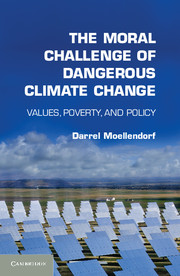Book contents
- Frontmatter
- Dedication
- Contents
- Acknowledgments
- Introduction
- 1 Danger, Poverty, and Human Dignity
- 2 The Value of Biodiversity
- 3 Risks, Uncertainties, and Precaution
- 4 Discounting the Future and the Morality in Climate Change Economics
- 5 The Right to Sustainable Development
- 6 Responsibility and Climate Change Policy
- 7 Urgency and Policy
- Afterword Frankenstorms
- Appendix A The Antipoverty Principle and the Non-Identity Problem
- Appendix B Climate Change and the Human Rights of Future Persons: Assessing Four Philosophical Challenges
- Appendix C The Right to Sustainable Development versus International Paretianism
- Appendix D Declaration on Climate Justice
- Bibliography
- Index
- References
6 - Responsibility and Climate Change Policy
Published online by Cambridge University Press: 05 June 2014
- Frontmatter
- Dedication
- Contents
- Acknowledgments
- Introduction
- 1 Danger, Poverty, and Human Dignity
- 2 The Value of Biodiversity
- 3 Risks, Uncertainties, and Precaution
- 4 Discounting the Future and the Morality in Climate Change Economics
- 5 The Right to Sustainable Development
- 6 Responsibility and Climate Change Policy
- 7 Urgency and Policy
- Afterword Frankenstorms
- Appendix A The Antipoverty Principle and the Non-Identity Problem
- Appendix B Climate Change and the Human Rights of Future Persons: Assessing Four Philosophical Challenges
- Appendix C The Right to Sustainable Development versus International Paretianism
- Appendix D Declaration on Climate Justice
- Bibliography
- Index
- References
Summary
“Seemeth it a small thing unto you to have eaten up the good pasture, but ye must tread down with your feet the residue of your pastures? And to have drunk of the deep waters, but ye must foul the residue with your feet? And as for my flock, they eat that which ye have trodden with your feet; and they drink that which ye have fouled with your feet.”
– Ezekiel 34:18–19There are costs in taking morally appropriate precautions against climate change–caused future catastrophes. These costs involve expenditures in the pursuit of climate change mitigation and savings to reduce future adaptation costs. Many of us need to consume energy generated by means other than burning fossil fuels. For some time at least, this will be more expensive than using coal, oil, and natural gas. If we divide all of our income into two broad categories – one directed toward consumption and another directed toward savings – spending more on electricity generated by, say, wind or solar cells will result in less money available to use for other kinds of consumption. This can be thought of as a kind of savings, but not primarily for ourselves. Most of the beneficiaries of climate change mitigation will live after we have died. Increased energy prices and tax-financed public investments in adaptation amount to savings programs for the future forced on us by current public policy. But for many people now alive – indeed, for most of them – savings for others would simply be a means by which their impoverishment would be deepened or prolonged or both.
- Type
- Chapter
- Information
- The Moral Challenge of Dangerous Climate ChangeValues, Poverty, and Policy, pp. 152 - 180Publisher: Cambridge University PressPrint publication year: 2014



